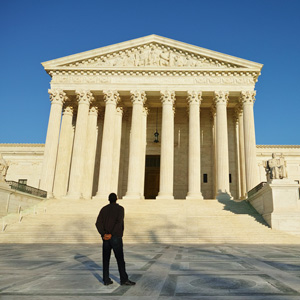Supreme Court lets stand ruling in favor of ABA in blind man's LSAT disability suit

The U.S. Supreme Court on Monday let stand a ruling in favor of the ABA in a suit by a blind man who claimed accreditation standards discriminate against law school applicants with disabilities.
The Supreme Court denied cert in the case of Angelo Binno, who claimed three law schools had rejected him because of poor performance on the Law School Admission Test, Law360 (sub. req.) reports. Binno said it was discriminatory for the LSAT to include questions requiring spatial reasoning and the ability to diagram.
The Cincinnati-based 6th U.S. Circuit Court of Appeals ruled last June that Binno had no standing to sue the ABA because his injury was not caused by the association. The LSAT is written, administered, and scored by the Law School Admission Council, which is not part of the ABA, the opinion pointed out.
ABA accreditation standards and procedural rules require law schools to use admissions tests that are valid and reliable, and it presumes the LSAT meets those standards, the 6th Circuit opinion said. The ABA does not set a particular weight that law schools should give to LSAT scores in deciding whether to admit applicants.
“It is thus clear,” the 6th Circuit said, “that the ABA does not actually ‘mandate’ use of the LSAT and, moreover, nothing in the standards gives the ABA authority to prescribe its content. In that sense, the district court correctly noted that Binno had sued the wrong party. The law schools to which he applied, not the ABA, determine what weight, if any, to give Binno’s LSAT score, and the entity in control of the LSAT’s content and format is not the ABA but the LSAC.”
ABA President Linda A. Klein commented on the cert denial in a statement. “The American Bar Association is pleased that the U.S. Supreme Court denied certiorari in the suit brought against it by a Michigan plaintiff,” she said. “The high court’s decision validates two lower court decisions as well as our position that the ABA was never the proper defendant in this suit because we do not administer the LSAT.”



